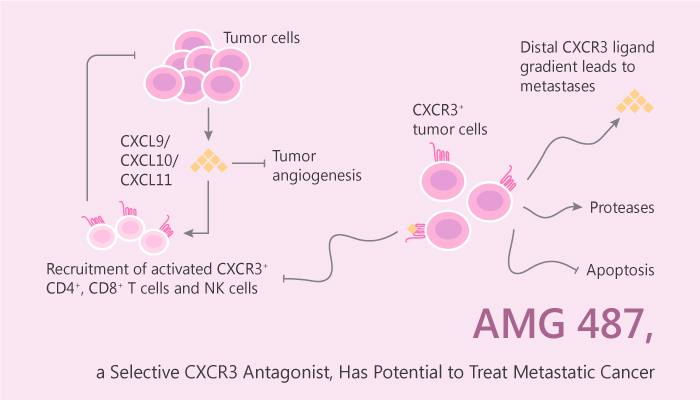In previous blog, we introduced AMG 487 as a potent, orally active and selective CXCR3 antagonist, which inhibits the binding of CXCL10 and CXCL11 to CXCR3 with IC50 values of 8.0 and 8.2 nM, respectively.
Today, I’d like to describe the antitumor effect of AMG 487 on metastatic cancer.

Tumor cells aberrantly express chemokines and/or chemokine receptors, and some may promote tumor growth and metastasis. Previous studies have verified that AMG487 blocked in vitro lymphocyte migration mediated by CXCL9, CXCL10, or CXCL11.
Additionally, a study from Tonya C. Walser examined the expression and function of chemokine receptor CXCR3 in a syngeneic murine model of metastatic breast cancer. Subsequently, the authors verified the effect of AMG 487 on lung metastasis in breast cancer animal models. And this anti-metastatic activity was compromised in mice depleted of natural killer cells.
As a result, the CXCR3 antagonist did not affect proliferation of the tumor cells at 24, 48, or 72 hours under normal or serum-free growth conditions. However, AMG487 did, inhibit the migration of 66.1 tumor cells to CXCL9 by ~70%. Furthermore, AMG487-treated mice had developed fewer metastases than vehicle-treated mice (113 versus 171 metastases; P = 0.01). And AMG487 with the concentration of 1 μM developed into fewer lung metastases than control group (40 versus 104 metastases; P < 0.001).
Due to its toxicity to tumor cells, the authors carried out a proliferation assay in immune-competent mice, depleted of NK cells, and mice lacking functional T cells (SCID mice) injected by 66.1 tumor cells to rule out the possibility of the inhibitory of AMG 487 on lung metastases. As a result, groups treated by AMG487 developed fewer lung metastases than control groups (98 versus 190 metastases; P = 0.02). When the host was depleted of NK cells, however, all therapy normally conferred by AMG487 was abolished. These data confirmed AMG 487 as a promising clinical candidate in metastatic cancer treatment.